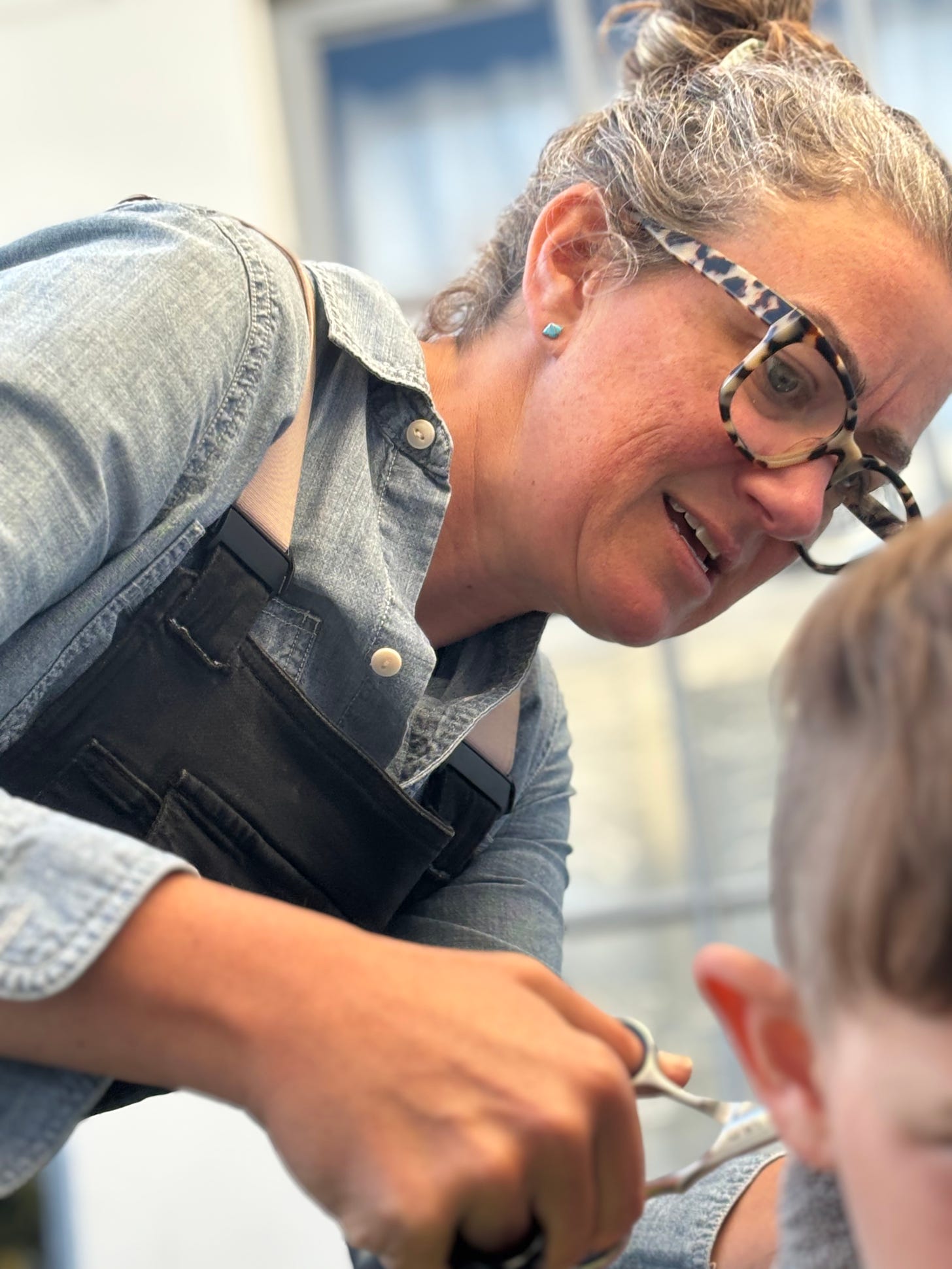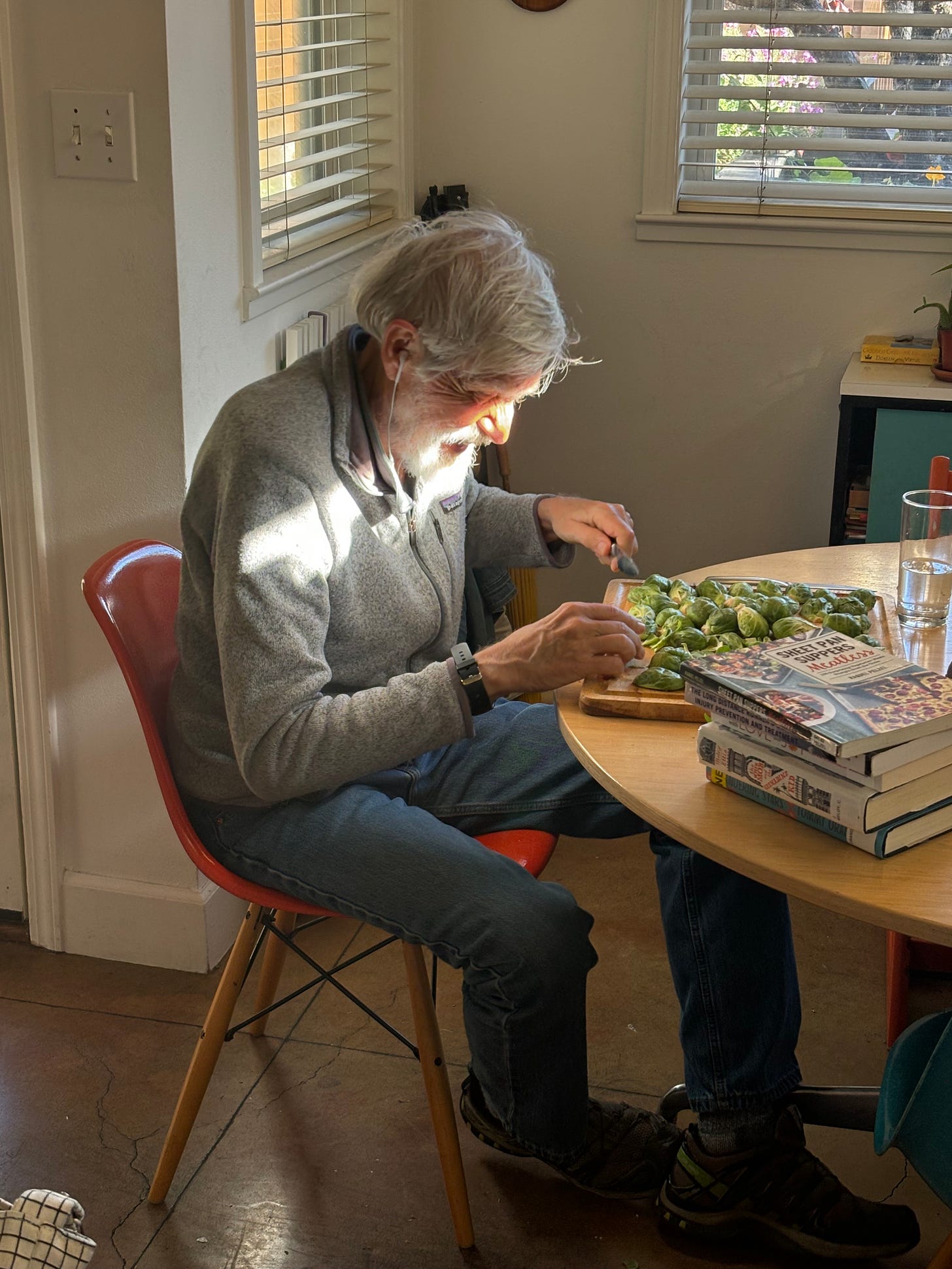Anne Lamott says, “Help is the sunny side of control,” and I’m afraid I know exactly what she means.

I have historically had a lot of ideas about how I can help other people—workshops they should take, personality inventories they should fill out, and of course, books they should read (see what I did there?). On Glennon Doyle’s podcast, We Can Do Hard Things, she recently admitted to actually reading books as if she were the friends she thinks would benefit from them, almost like literary helper cosplay, and I admit I knew exactly what she was talking about. I have even written marginalia tagging different paragraphs with friends’ names so I can remember to tell them later about how this point applies to their lives. My poor husband can tell you nine thousand podcasts that I’ve sent him and nine thousand and one books that I’ve put on his bedside stand (except he can’t tell you, actually, because he basically ignores all my suggestions).
Probably a decade ago now, a dear guy friend told me, “Courtney, I love being around you because I know you see the best version of me and it makes me want to be that person.”
He meant it as a compliment, but I haven’t stopped thinking about the shadow side of what he was saying ever since. Shouldn’t my friends feel like I see the real version, not the “best” version of them? Shouldn’t they feel like they are exactly who they are supposed to be already and I love them unconditionally? Yes and yes.
I am an enneagram 2 (yes, this is a quiz you should take!), so helping is a core joy for me and, without a doubt, my kryptonite. Whereas someone with an eating disorder has to encounter food everyday, I have to encounter opportunities to help. Just as food can be nourishing and delightful when someone is in right relationship to it, so goes help; both food and help can also be warped, used as transaction, manipulation, symbols of worthiness or unworthiness.
I’ve been unpacking this for years and I still feel like I’m in an emotional and somatic fog about it all, albeit much less dense than it used to be. Here’s what I know: when I help from a place of pure heart with full consent, it brings me the kind of joy that makes life worth living. I feel useful and fulfilled and connected. I’m thinking about a few months last fall when I supported a dear friend to organize her thoughts around a book project that had profound meaning for me and I deeply believe needs to be in the world. I looked forward to our zooms. I relished reading her work. I wanted to be a part of it, not fix anything or push anyone to live up to any standard other than the native one of that beautiful project.
I’ve also witnessed this pure and consensual helping in others. I recently asked a friend to help me figure out how to fix my mom’s hearing aid. She called three places, picked the one she thought was a best fit, I hopped in her car for an errand date, we met a delightfully, quirky hearing aid repair guy who fixed it on the spot (for free!) and then we drove home and blessed my momma with less shitty hearing. What a transcendent 30 minutes!
Here’s what else I know: helping can become compulsive for me. I ruminate on what I could do for someone, how I could make her life easier, how I could have a conversation that would liberate her from some delusion, how I could help her get free or have more ease. This might sound relatively innocent, and it often feels that way for awhile, but I’m starting to understand that it is a slippery slope into arrogance (Who appointed me the arbiter of delusions? How would I know what actually makes someone else feel free? Why am I so obsessed with speeding up my beloveds’ self-development when I know my foot is not and has never been on the accelerator?).
Also, at a deep subconscious level, I know it is about my own dis-ease in the world and desire to see it as perfectable and controllable. I want it to make sense, damn it. Being alive can’t possibly be this heartbreaking and and unfair and chaotic, can it? Let me find my depressed friend the perfect absorbing activity that will pull him out of his depression or start a GoFundMe for that family struggling at our school. Let me think about these things obsessively instead of feeling my feelings about war and my parents’ aging bodies and my kids’ warming future.
As Glennon Doyle said in her podcast, while her own ideas about how other people should live is obviously a problem, she does have some pretty good ideas. I feel the same way. My helping has, well, helped a lot of amazing humans.
The goal is not to stop helping or abandon my core way of gazing out at the world—with wonder and love for my people and passion for the possibilities of more beauty and justice. The goal is to become ever more attuned to when help is connected, or when it is a compulsion, when it is consensual, or when it is controlling, when it is diving deeper into the marrow of life, and when it is a subconscious effort to escape life’s inevitable and sometimes gorgeous and sometimes cruel chaos.

The goal is also to discern my own boundaries. Some people in my life resist my help and some people in my life will take as much help as they can get. (There are plenty of people in between, of course.) The only thing I have sovereignty over is my own ability to feel into what I can give with a spirit of abundance and pleasure, and when I need to say no. Sometimes it starts in abundance and somehow I lose the signal, finding myself in a desert of resentment. This, too, I am slowly learning how to avoid though I don’t find it easy or intuitive at all.
The goal, finally, is to get better and better at accepting help and even, and this is the black belt for me, asking for help. I can only become more attuned to the wise kind of helping if I let it flow both towards and away from me, if I dwell in the knowing that I am as needy and vulnerable as everyone else. This week I told my friend he could bring us dinner when my first thought was, “We’re fine.” I asked multiple aunties to take my kids’ after school. I texted a beloved group chat asking for prayers and witnessing. I want so many gold star, please. I am growing!
This all reminds me of one of my favorite poems, “The Seven of Pentacles,” by Marge Piercy. She writes: “Live a life you can endure: Make love that is loving.”
This is the simplicity on the other side of all that complexity: help that is wise is just love that is loving. That’s my deepest desire—both as a giver and receiver.
I hope (fingers and toes crossed) I’m not alone in this. For other helpers out there, tell me tell me tell me what you know about how to get in right relationship to it all. Help me!




I totally relate! I am a two as well. I can’t tell you how many debates/arguments I’ve had where I am quick to say “I was just trying to help!” I am always reacting to family situations and trying to figure out how best to fix others’ relationships (I can’t.) My current goal is noticing/catching myself and asking if this is mine to do. I also just heard and like Ann Lamott’s acronym WAIT (why am I talking?) because I know me listening would be more authentically helpful than interrupting to “fix.” And I love your goal of asking for and accepting help. Thank you for a meaningful article!
Oh SOOOOOOOO not alone in this! I SO recognized myself in every phrase, word, urge--and even had the urge to share your wise wise wise piece with someone---you guessed it!---who I though needed it, too! Carry on, beautiful Courtney! Your wisdom-infused distilled light shining (yup, all the metaphors mixed!) lights me up. Helps me see. And I've a hunch I'm not alone! p.s. Way back when I was 28, I was in treatment for alcoholism. My counselor pulled me aside to address my *ahem!* over-helping. I retorted instantly--oh you don't UNDERSTAND! I do this because I care so deeply! She calmly called me out. "Lynn, how do you know what's best for others? That's grandiose." Bam. Outed! It stung, but she was right! So here I am----girl who cares---with better boundaried urges every single day (or most days!) xo